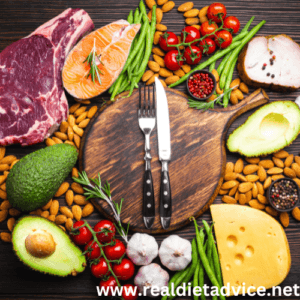What is Healthy Balanced Diet?
Maintaining optimal health and well-being requires a healthy, balanced diet. A balanced diet is a combination of vitamins, proteins, carbohydrates and fats that are tailored to the individual’s needs and lifestyle. Understanding the key components of a healthy diet and adapting your eating habits to them will improve your mental and physical health, boost immunity, and reduce your risk of chronic disease. This article will explore the main components of a balanced healthy diet, and give you practical tips for how to include them in your daily meals.
Your body requires certain nutrients to function optimally. To achieve this balance, you must obtain your daily calories through the following sources:
- Fruits and vegetables
- Whole grains
- Legumes
- Nuts
- Lean proteins

The average person needs 2,000 calories a day to function well. The caloric requirements of a person are also determined by their age, gender and level of exercise. You will need 1,600 to 2,400 calories a day if you are over 30 and sedentary. If you’re an active male in the same age group, you need between 2,000-3,000 calories each day.
Avoid foods high in empty calories as they can interfere with your daily activities. These foods include pastries, pizzas, fries, sugary fruit juices, sodas, and sodas.
Why is a Balanced Diet Important?
Diet, or the amount of food you consume, is crucial to peak performance. If you don’t eat healthy, you may suffer from illness, fatigue, infections and poor performance.
A lack of nutrition may affect a child’s academic performance as well as the development of their brains. Poor nutrition can increase the susceptibility of children to infections and diseases.
Balance is important, so eat a wide variety of foods. Include fresh fruits and veggies, whole grains and legumes, as well as lean proteins. Limit the number of empty calories you consume, such as those found in sweets, sugary drinks and sodas.
What is Nutrition?
Nutrition is the process of replacing tissues with food. It is based on key nutrients like protein, carbohydrates and fatty acids.
Unbalanced nutrition or nutrient disorder is one of the major aspects of nutrition. This condition can be caused by an insufficient intake of certain nutrients. You would have to eat 56 grams of protein per day if you weigh 70 kg. If you eat less, then you are deficient.
Iodine, iron, and vitamin A deficiency are all common today. These deficiencies can be easily overcome by a diet rich in fruits and vegetables, whole grains, and legumes.

Why is Nutrition Important To Health?
Nutrition is essential to maintaining and achieving your best health.
Poor nutrition can trigger or worsen a variety of health conditions. Unhealthy eating patterns, for instance, can increase your risk of becoming obese. You can also be at risk for heart disease, cancer, diabetes type 2 and osteoporosis if you have poor nutrition.
Nutrition habits can be formed in childhood, according to experts. In order to maintain a healthy diet, it is crucial that children are introduced to healthy food at an early age. If you’re not happy with your nutrition, you can consult a nutritionist. They can help you develop healthy eating habits, and show you the foods you should eat.
To achieve a healthy body weight, combine good nutrition with regular physical activity. You will also improve your health and reduce your risk for chronic diseases.
What are Nutritional Diseases?
Humans can be affected by nutritional diseases. Food allergies, intolerances, allergies, nutritional deficiencies and excesses, as well drug-nutrient interactions and developmental disorders are all examples of these diseases.
Here a few of the most common nutrition disorders:
- Iron deficiency
- Iodine deficiency
- Vitamin D deficiency
- Vitamin B12 deficiency
- Calcium deficiency
- Vitamin A deficiency
- Magnesium deficiency
- Obesity
- Diabetes
Iron deficiency
Iron deficiency increases your risk of developing anaemia. Anaemia is a condition where your red blood cell count drops below normal and your body’s ability to transport oxygen is compromised. The symptoms include fatigue, weakness, and impaired neurologic functions.
Iodine deficiency
Iodine deficiency can affect thyroid hormone production. This is responsible for brain and bone functions. The symptoms include an enlarged thyroid gland or goitre, increased heartbeats, shortness and weight gain.
Vitamin D deficiency
Vitamin D deficiency may lead to bone fragility and loss. Children can be affected by the softening and delay in growth of their bones. The symptoms include depression, fatigue, and muscle and bone pain.
Vitamin B12 deficiency
This vitamin deficiency may cause large, immature red blood cells, nerve injury, and paralysis. This condition is characterized by brain dysfunction as well as high levels of homocysteine in the blood plasma, an amino acid that occurs naturally.
Calcium deficiency
Calcium is essential for the proper functioning of your teeth and bones. The most common sign is osteoporosis. This condition is marked by soft and fragile bones.
Vitamin A deficiency
The most common cause of blindness that can be prevented in children is vitamin A deficiency. A vitamin A deficiency can also cause children to be more susceptible to illnesses and lower their immunity. Dry skin, epithelial cells that harden, and growth impairment are all symptoms.
Magnesium deficiency
Magnesium deficiency can also cause other complications, such as type 2 diabetes, cardiovascular issues, metabolic syndrome and cardiovascular issues. Its symptoms include migraines, restless leg syndrome, muscle cramps, and an irregular heartbeat.
Obesity
An obese person has excess fat on their body. This increases your risk of developing diabetes, arthritis, and heart disease. People with obesity often experience shortness-of-breath, excessive sweating, and snoring. Other symptoms include skin problems, fatigue and joint and back pain.
Diabetes
Type I diabetes is a result of high blood sugar (hyperglycemia), caused by an insufficient level of insulin. Diabetes type 2 is caused by cells which do not respond well to insulin. Both diabetes types share similar symptoms, such as thirst, hunger, fatigue, and frequent urination.
Does nutrition affect the immune system?
Some nutrients can strengthen your body’s defence against viruses. According to nutritional studies, plant-based foods kickstart natural killer cell activity. It is part of the innate immune system that filters out pathogens and viruses.
Plants-based foods can boost your immunity system, including
- Mushrooms are rich in polysaccharides, antioxidants and other compounds that improve immunity and reduce inflammation.
- Fruits & vegetables. The brightly colored fruits & vegetables are a good indicator of the presence of anti-inflammatory phytochemicals.
- Bitter Greens – Dandelion, arugula and other weeds promote liver health, which supports the production of natural killer cells.
- The digestive system is a focal point of immune activity.
Flax seed is rich in omega-3 fat acid which reduces inflammation and helps improve absorption of fat-soluble vitamins D E and A to strengthen immunity.
What is the impact of nutrition on your pregnancy?
A balanced diet will ensure that your baby grows properly during pregnancy. Nutritious foods not only improve your health but also your chances for a more comfortable labour and delivery. For this reason, pregnant women need to consume nutritious foods like lean proteins. To achieve this, pregnant women should consume nutritious foods such as lean proteins (e.g. They should also consume enough iron to prevent anaemia, folate to prevent neural tube defects, and calcium to develop their child’s bones. Pregnant mothers can obtain these nutrients by eating a lot of fruits and vegetables.
What is the impact of nutrition on your athletic performance?
A good nutrition plan is important, especially if you want to perform consistently at your best. Proper nutrition is important for any sport. It will increase your energy levels, speed up recovery, keep you hydrated and improve your overall health. Sports nutritionists suggest to their clients a diet rich in whole grains, lean protein, low-fat dairy, fruits and vegetables, as well a diet that is high in whole grain.
What is a FODMAP Diet?
This diet is low in fermentable carbohydrates (also known as FODMAPs). Health experts recommend this diet to clients with IBS. These are the main sources for each FODMAPs group:
- Oligosaccharides : Wheat, rye and legumes. Fresh produce.
- Disaccharides : Lactose, from milk, yogurt, and soft cheese
- Monosaccharides : fructose in mangoes, figs and sweeteners like honey and agave nectar
- Polyols are a combination of specific fruits such as blackberries, lychee and low-calorie sweeteners found in gums without sugar.
Reduced consumption foods that are high in FODMAPs can reduce stomach pain, bloating, and other symptoms of IBS up to 75% and 81%. FODMAPs may also reduce IBS symptoms such as flatulence and diarrhea.
Which is the Best Diet for Weight loss?
If you want to lose weight, no matter which diet plan you use, you need to have a caloric excess. What does this mean? This means that you burn more calories than you consume. If you consume only 1,500 calories but burn 2,000, then you will lose weight. For best results, your exercise program and diet should complement each other. Exercise alone will not yield long-term benefits.
You can get help with your nutritional and dietary concerns
Real diet advise research team and nutritionists work together in order to help you achieve and maintain your diet and nutrition goals. Our goal is to change the way you approach food and nutrition, regardless of our different backgrounds. We want you to feel better for the rest of your life by changing your eating habits.
Recommended Post For You
- Evidenced-Based Eating: Exploring 5 Diets That Have Stood the Test of Science
- The Quality-First Approach: Uncovering The Ultimate Diet Secret
- Building a Balanced Plate: A Practical Guide to Real Diet Advice for Everyday Eating
- Nature’s Bounty: Embracing the Raw Food Diet for Optimal Health and Wellness
- Debunking Diet Myths: A Comprehensive Guide to Authentic Weight Loss Tips
- The Science of Healthy Eating: Cutting Through the Noise of Fad Diets
- Breaking the Cycle: Unraveling the Complex Relationship Between Stress and Emotional Eating
References:
- Eating a balanced diet
https://www.nhs.uk/live-well/eat-well/how-to-eat-a-balanced-diet/eating-a-balanced-diet/ - Healthy Eating Plate
https://www.hsph.harvard.edu/nutritionsource/healthy-eating-plate/ - Healthy Eating for a Healthy Weight
https://www.cdc.gov/healthyweight/healthy_eating/index.html - Healthy diet
https://www.who.int/news-room/fact-sheets/detail/healthy-diet
